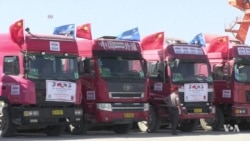China recently launched a diplomatic and economic development campaign called ‘One Belt, One Road.’
The name comes from the ‘Silk Road’ - the ancient system of roads that linked China with Central Asia and other areas. Traders used those paths centuries ago to transport Chinese silk, spices and other goods to the west. In exchange, China received gold, ivory, glass and other products from as far away as Europe.
Chinese President Xi Jinping says the One Belt, One Road program is aimed at strengthening international cooperation. But former American officials and some business leaders have expressed concern. They say China is not as interested in opening up to foreigners as it claims.
China's plan is to build ports, railroad links, roads and other infrastructure across Asia, Africa and Europe. The Reuters news agency reports the project is depending heavily on two lenders, the China Development Bank and the Export-Import Bank of China. It says they have already provided $200 billion in loans to countries throughout Asia, the Middle East and Africa.
At a recent conference in Beijing, President Xi described the effort as a win-win situation for the countries and companies involved in the project.
But some Americans are questioning China's true goals. Charlene Barshevsky served as U.S. Trade Representative when Bill Clinton was president.
“China has stopped the process of economic reform and opening, and instead has put in place a spate of measures that are zero-sum, highly mercantilist, and discriminate against U.S. and foreign companies.”
Because of the business climate in China, the country is no longer considered a top investment choice for a growing number of foreign companies. This was the finding of a study done by The American Chamber of Commerce in China.
William Zarit is head of the trade group.
“…some companies are looking back to North America where especially energy costs are much lower, and perhaps labor is not that great a factor in their manufacturing product, and rule of law and transparency are the name of the game.”
Observers note that China no longer depends on foreign technology and investments as it once did. For that reason, they say, Chinese officials are less concerned about companies leaving the country. But some critics say China still may pay a price for shrinking investment because of the government’s policies.
Ted Moran studies economic issues for the Peterson Institute for International Economics.
“China is already such a huge presence on the world economic stage, so I’m not predicting any kind of disaster, I just think that there will be much slower growth and much less robust growth over the next decade.”
While China’s president spoke about inclusiveness at the recent conference, some American companies remain concerned that it may be more talk than substance.
I’m Caty Weaver.
Natalie Liu wrote this story for VOANews.com. George Grow adapted her report for Learning English. Hai Do was the editor.
_______________________________________________________________
Words in This Story
infrastructure – n. the underlying support of a system or organization; public works projects
spate – n. a large number or amount
zero-sum – adj. of or related to a situation in which a gain for one side leads to a loss for the other side
mercantilist – adj. of or related to an economic system that increased the monetary wealth of a nation
factor – n. something that influences a result
transparency – n. openness
stage – n. a raised area in a theater on which the acting takes place
decade – n. a period of 10 years
We want to hear from you. Write to us in the Comments Section.





